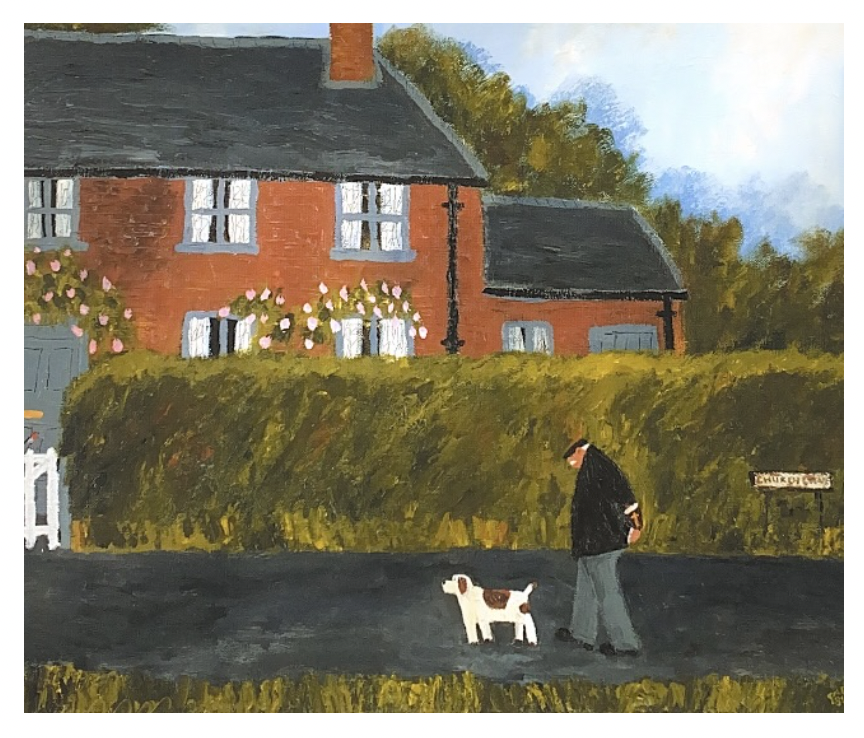"When I spend a day talking I feel exhausted, when I spend it walking I am pleasantly tired."
Scottish poet Thomas A. Clark's (born in 1944) delightfully elegant prose poem In Praise of Walking
Early one morning, any morning, we can set out, with the least possible baggage, and discover the world.
It is quite possible to refuse all the coercion, violence, property, and triviality, to simply walk away.
That something exists outside ourselves and our preoccupations, so near, so readily available, is our greatest blessing.
This "something" Clark mentions, is it the same "something" that brought waves across the ocean, as American poet Mary Oliver wondered? Is it the same "something" that Transcendentalist Henry David Thoreau noted was beyond all of this? The repetition of words, and the similarity of language, is a particularly special feature of the human continuum. It suggests a repetition of ideas, questions, doubts, and observations.
"Something" is genuinely something that connects us. Even if we have no idea what it is.
 Evening trail in Sussex, England.
Evening trail in Sussex, England.Clark recognizes that walking is about harmony. Harmony of mind and body, between our bodies and the earth beneath. And that by walking, we enact the choice to coax out the hidden.
There are things we will never see unless we walk to them.
Walking is a mobile form of waiting.
What I take with me, and what I leave behind, are of less importance than what I discover along the way.
The close relationship between footfall and consciousness is well-known to many. Creatives suffer from abundant thought and ideas (and a need to empty oneself). With that streaming of ideas comes a compulsion for movement, and the two become symbiotic. Walk for hours, and thoughts will be purged, summoned, or ordered.
"It is in our idleness, in our dreams, that the submerged truth sometimes comes to the top." figured Virginia Woolf in her timeless study of what conditions were necessary for the creation of art.
 Gary Bunt's "Church Lane" is a selection from his illustrated wander around the universe's unknowable mysteries.
Gary Bunt's "Church Lane" is a selection from his illustrated wander around the universe's unknowable mysteries.The narrative of In Praise of Walking is short-lived and directional, yet it takes us on a journey through imagined forests, fields, over rocks, and under varied skies. Clark's writing is perfect elegance. Nothing omitted is necessary; nothing present is unnecessary.
As Ernest Hemingway observed, it is no mistake that the Gettysburg Address is short. Good prose omits the unnecessary.
Read more on the poetry of Rupi Kaur (which many argue isn't even poetry, to which I say, who are we to say?) and certainly the lush, barely there writing of Lydia Davis, a Man Booker Prize winner for her short, short, short fiction.
And yet, truth abounds. I love Clark's easy summary of nighttime walks. "To walk for hours on a clear night is the largest experience we can have."
Poet Maria Rainer Rilke advised we should go into ourselves in the quietest part of night, while Ralph Waldo Emerson bid us to look to the stars to find meaning and overcome solitude.
Read more on how we spend this empty, open and welcoming space of night.
To be completely lost is a good thing on a walk.
The most distant places seem accessible once one is on the road.
Convictions, directions, and opinions, are of less importance than sensible shoes.
[...]
When I spend a day talking I feel exhausted, when I spend it walking I am pleasantly tired.
As we move through time and space and choose to go this way or that, we form a line of existence. Clark understood this delineation. So does Andy Goldsworthy, a British sculptor who builds walls to demonstrate a physical existence that mimics our own.
 "The Storm King Wall", 1997-98 by Andy Goldsworthy. Learn more.
"The Storm King Wall", 1997-98 by Andy Goldsworthy. Learn more. A bright companion to Clark's gentle sermon In Praise of Walking is Robert Macfarlane's study of the human need to forge paths and trails (and how they form us in return). Britain has long-cultivated hikers and walkers; I've gathered a few in my post, The Importance of Walking About.
 The walking wood.
The walking wood.For a guide to the temporary delights you might glimpse while walking, grab this superlative miscellany on the history and meaning of flowers or the jocular thoughts of Jan Morris while walking. Both are small enough to carry.

